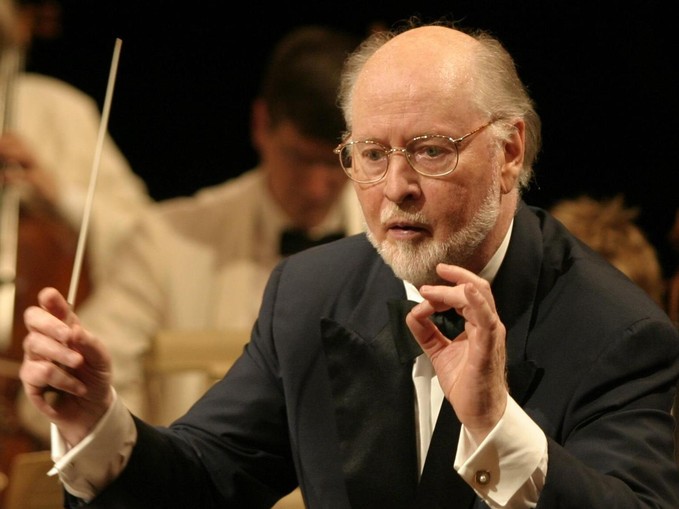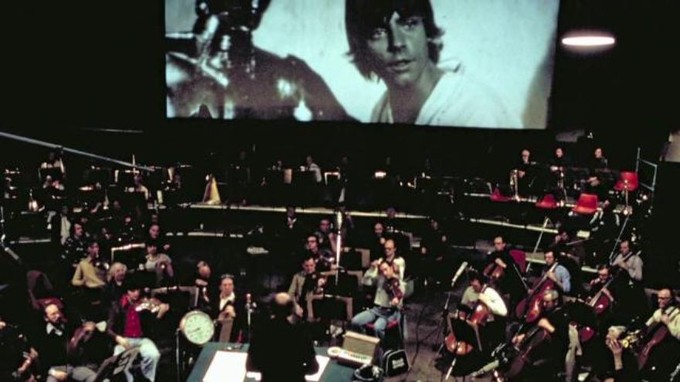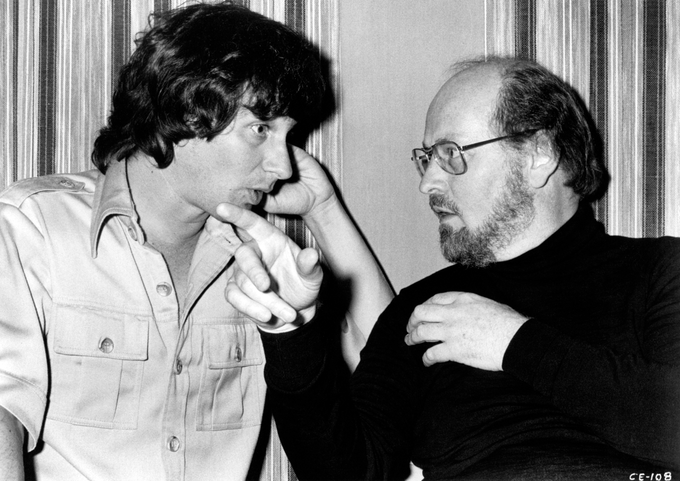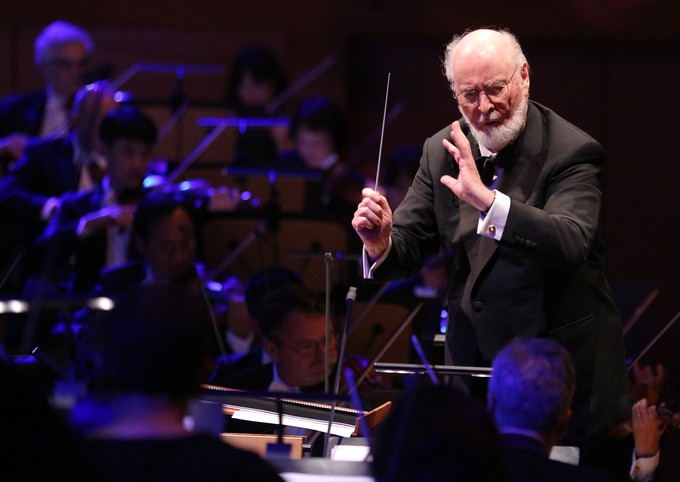Ahoy, squirts! Quint here. I tend to write up a lot of the obituaries around here, which is a job that is somehow both uplifting and super depressing. There's a bittersweet feeling when writing about someone who has passed. You look over someone's career and really appreciate the work they've done because these artists have touched us in a remarkable way and start a dialogue with you crazy sumbitches in the talkback below where there's usually an outpouring of love. I always enjoy seeing that and it makes me feel like this is a real deal film community engaging in a shared affection. The nagging bitter part is that some of these people might not know just how much they were appreciated and it takes them dying for us to focus on them.
I'm tired of that, so instead of waiting to say how much we appreciate someone in an obituary how about we do it when it matters?
Today is John Williams' birthday. He's turning 84 and while that's not young, the man is still going strong. He turned in a new Star Wars score for JJ Abrams and is currently working with his long time collaborator Steven Spielberg to score the director's next flick, The BFG.
I figured his birthday would be a good excuse to listen back to some of his more memorable scores and talk a little about how he changed the face of movie music.

The man has an interesting origin story, but you can hit up IMDB and get the nitty gritty on that if you want. The short-short version is he performed his first original piece at age 19 and composed for the first time while he was in the Air Force. When he returned from service he played jazz clubs as Johnny Williams to pay the rent while he established himself as a regular piano player for Hollywood film and TV. Orchestrating for TV and film led this his first composing gig, a quickie low budget thing called Daddy-O.
Williams balanced TV and movie work for the next 6 years before really contributing his first work of note: the score for Don Siegel's THE KILLERS.
As you can hear, his work was still heavy in the Jazz department, but even there you could tell he wasn't afraid to be bold. Too many composers these days are content with supplying only mood music, which is something Williams was never interested in.
While he spent most of the '60s doing comedies and funky TV work, you could tell by 1966's How To Steal A Million that the John Williams we all know and love was ready to come out and play.
It's a fun, complex and catchy score, one sticks with you. A few years later he did a not-much-talked-about Steve McQueen flick called The Reivers and it's that score that really sounds like the John Williams I grew up with.
He'd been well-known in Hollywood up until this point, but he took it to the next level in 1972 when he won the Oscar for arranging the movie adaptation of Fiddler on the Roof:
You can tell that this was a big boost looking at his film-only composing he did in the years following. Great stuff, like the John Wayne western The Cowboys, Altman's creepy flick Images, the completely different jazzy score for The Long Goodbye and a great blues-y work for Mark Rydell's weird James Caan vehicle Cinderella Liberty, in which he teamed with Paul Williams, of all people. Paul and John Williams together!
Then everything changed in 1974 when he worked with a young hotshot director named Steve Something-or-other on a little true crime story set in the Texas called The Sugarland Express.
Williams' work always stood out, but it wasn't until his second collaboration with that young Spielberg kid that it became almost as important as the main monster.
I could make this whole article about his Jaws score and not just because it's my favorite movie of all time, thanks in no small part to his contribution. My favorite parts of the score isn't the iconic Dum-Dummmm, Dum-Dummmmm shark theme, but the swashbuckling adventure music that plays in the second half as our floating trio hunts down the killer shark.
Williams always delivered quality, not just in the scores I've mentioned already, but in a handful of good stuff I've skimmed over like The Towering Inferno and The Poseidon Adventure, but to me his Jaws score is the first front to back score of his that blew me away. There's such a great playfulness to the music and variety on display. The music swells to make you jump out of your seat or to make you laugh or get the blood pumping as the Orca chases down the shark. It's a perfect score and one that not only elevates the film, but plays an integral part of the storytelling on display.
Gotta skim over a few other great scores (or this thing will be 200,000 pages long), but post Jaws you essentially got a mad rush to Star Wars that included composing music for Hitchcock (Family Plot), Arthur Penn (Midway) and John Frankenheimer (Black Sunday, which is awesome, by the way).
All great scores in their own right, but in terms of cultural significance the next one up after Jaws was Star Wars.
Once again, it's a score that is entwined with the film that you can't separate the two. If you need any evidence of that, I give you an early trailer for Star Wars that doesn't carry Williams music:
It just feels wrong, doesn't it?
Star Wars will be William's legacy and that's incredible when I can name off a half-dozen of his scores I prefer to any of his Star Wars music. The guy who did amazing music for all seven of the existing Star Wars feature films has done better work. The man is a genius.

One of those scores is for a stupid little comic book movie he did for Richard Donner.
I still get goosebumps to this day when I hear this music. Pro-tip, if you cue up the main theme right when your airplane starts jetting down the runway you lift off right when the music really starts amping up and you feel like Superman yourself for a little bit.
Williams did great work with Lucas and De Palma (The Fury), but it's without question that his collaborations with Spielberg produce this greatest work. There's just something to how Spielberg trusts in him to let the music be more than dressing for his imagery that pushes their work over the edge.

Close Encounters is probably the key example of that. Williams' music in Jaws represented the shark when there was no shark to show the audience thanks to Bruce being temperamental, but Spielberg actually makes the score for Close Encounters a part of the story. It's how the humans talk to the aliens and how the aliens speak back.
The two men never turned in a forgettable collaboration in this time period. It was movie magic embodied by perhaps the best visual filmmaker to ever live and the best film composer of his era.
1941 is derided and it's hard to defend on many levels (and I do try because I love it), but nobody on God's green Earth can say the score is anything less than a masterpiece.
Think about this for a second. Within a 5 year period Williams turned in Star Wars, Superman, 1941, Raiders of the Lost Ark and ET. Any one of those scores would be the best thing 99.9% of film composers that have ever lived would have accomplished.
His Indiana Jones work is probably my favorite stuff he's ever done. I love his adventure scores so much and the first three Indy movies all have flawless scores. Indiana Jones as an icon is equal parts Harrison Ford's perfect everyman hero performance, the striking silhouette and John Williams' theme.
All three scores are incredible, but I'm partial to one in particular. Bet you'll never guess which one...
I've been listening to this score on vinyl as I've been writing. I know that sounds like the ultimate hipster thing to write, but for the longest time you couldn't get the soundtrack any other way! I think because Temple of Doom is the pulpiest of all the Indy movies it gives Williams so much room to play. Much like his Jaws score he's able to move from horror to adventure to comedy to thriller and back again.
Last Crusade is my least favorite of the original three (we'll ignore Crystal Skull entirely if you don't mind), but I still like the movie and a lot of it is because of the spirituality that Williams injects into the film. Even though the movie gets really silly, the whole thing is grounded by an almost religiously heavy score from Williams. I feel like I'm in movie church when listening to this one.
If you thought I was going to skip over ET you're outta yer' mind! It's another perfect score from that time period where putting Spielberg and Williams in a room always gave you the best thing you've ever heard in your life. The overall score isn't my favorite of their collaborations, but I don't know if there's a better single cue from that time period than the Escape/Chase/Saying Goodbye flying bike section of ET.
While I really love their work together on Empire of the Sun, Hook and Always, it's Jurassic Park that I log as their last perfect pop culture collaboration.
That very same year he also delivered one of the most beautifully somber pieces of film music. Quite amazing for both men that they pulled off a one-two punch like Jurassic Park and Schindler's List.
I said that I counted Jurassic Park as the last of their perfect pop culture collaborations. That sounds like I'm shitting on all their work since then. I'm really not. I adore the scores for A.I., Catch Me If You Can and War of the Worlds, but they're not ones I get stuck in my head. They're more nuanced, less catchy. The work is still incredible, but you don't leave the theater whistling the theme to Munich or Saving Private Ryan or Lincoln.
Williams can still deliver that note-perfect catchy music, too. If you doubt that look no further than his Harry Potter music (Hedwig's Theme).
His work there instantly nails the tone of the movie. It's exciting, it's mysterious, it's a little scary. His Harry Potter work is just as good as anything he did in that amazing 1975-1982 run.
Same can be said for his work on all the Star Wars prequels. You probably know I'm not a big fan of those movies, but the music for all three is outstanding. Duel of the Fates is as good as The Imperial March and I'll be damned if I don't get Augie's Great Municipal Band stuck in my head at least twice a week.
It took me a little while to warm to his recent score for The Force Awakens, but once you get out of the way of the nostalgia of the pre-existing music and listen to his new additions you still see a master at play. Rey's Theme in particular is one that stirs strong emotions in me when I hear it.
We have another fantasy adventure from Spielberg that will feature John Williams music coming out soon (The BFG) and most likely his direct involvement (if not full on scoring) another Star Wars movie or two in the near future. That should make you all ridiculously happy.
John Williams is still going strong after all these years. He could have started phoning stuff in a couple decades ago and still be remembered as one of the greatest composers of all time, but he doesn't do that. He also doesn't put himself above his popular music.
I had the privilege of seeing him at the Hollywood Bowl a little over 5 years ago. He conducted movie music from all through the years, including cues from Bernard Herrmann's Psycho score, but I was smiling ear to ear when he got to Jaws. He not only did the main theme from Jaws, but also did what he called “the barrel chase scene” cues, starting with Brody chumming, “You're gonna need a bigger boat,” the harpooning of the shark, the chase that ensues and the shark disappearing, leaving the Orca floating quietly into the sunset.
It's one of my favorite pieces of movie music and I can't tell you how much it meant to me to sit there, watch the footage play on the screen as Williams himself furiously led a huge orchestra to recreate the magic of his notes and Spielberg's visuals live for a crowd full of people. It was one of the great joys of my life and a memory I'll always treasure.
John Williams not only has given us so much over the years, he's also forced other composers to raise their game, leading to one of the best scored decades of American cinema as Williams led the way for folks like Alan Silvestri, Danny Elfman and James Horner, to name a few. You can even feel his influence on legendary composers like Jerry Goldsmith in the '80s.
So, Happy Birthday, Johnny. Thank you so much for what you've given us over the years and what you continue to still deliver. I think I can speak for all of us when I say that our childhoods wouldn't have been the same without you.
Thanks for six decades of unforgettable music and here's to six more! I'll drink to your leg tonight, sir.

-Eric Vespe
”Quint”
quint@aintitcool.com
Follow Me On Twitter

